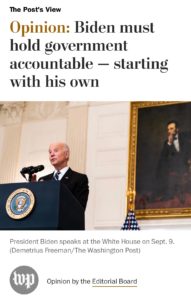By Kate Oh, Policy Counsel, ACLU
This week, an unusual array of characters and objects competed online for a dubious honor: Santa Claus, U.S. Department of State cables, a partial smiley face, Superman’s alter ego, a missing snack car on an Amtrak train, the retort “OK,” Beyoncé, and Conan the military dog. They were all the targets of the federal government’s excessive, arbitrary, or even absurd attempts at secrecy — with Conan’s example voted the winning favorite of Twitter users.

The online tourney was held as part of the Accountability 2021 coalition effort to bring government transparency and accountability reforms to the forefront of the national public policy debate. Although the examples may be amusing and funny at first blush, they illustrate a pernicious problem for our democracy: our government keeps too many secrets. And the egregious secrecy can be found across the federal government and for too many reasons, from a misunderstanding of what must truly remain secret to a massive backlog of public requests for information.
This state of affairs is incompatible with a system of government that is meant to be open, well-functioning, and accountable to its people. History has proven again and again that undue government secrecy thwarts oversight and weakens checks and balances against abuses of power — allowing corruption, incompetence, and human rights violations to fester.
Too many secrets in the national security context are even more corrosive, with enormous stakes for civil liberties and democratic accountability as well as profound life and death implications. One crucial example is the U.S. government’s post-9/11 treatment of detainees in U.S. custody overseas, who had been abused, tortured, and even killed by government agents using illegal interrogation tactics that were secretly authorized by a handful of Bush administration officials and justified on the basis of highly classified, and later repudiated, Department of Justice legal opinions. Had those senior officials engaged in open debate about their plans and justifications with Congress and the American public before implementation, it’s hard to imagine that they would have so brazenly rushed ahead despite the widespread condemnation that the later revelations would provoke.
Among the most instructive examples of secrecy are the ones where a federal agency redacted or withheld information that came to light later or elsewhere, exposing the flawed or even indefensible judgment behind the government’s decision to hide it. In the WikiLeaks case, one of the online contest candidates, the Department of State responded to a Freedom of Information Act (FOIA) request from the American Civil Liberties Union by sending back redacted versions of embassy cables that were already in the public domain — a shady decision compounded by the fact that the records contained criticisms of U.S. government policies such as torture and detention at Guantanamo. Those sources of shame for the U.S. government were conveniently withheld from the public as national security secrets.
In some instances, the federal government will refuse to even confirm or deny that a particular government record exists (i.e., issue a “Glomar” response) in response to a public request, even after having confirmed the existence of the same record in a different context. That is precisely what happened in another ACLU lawsuit in which the federal government stonewalled the release of rules governing the use of lethal force — whose existence the Department of Defense confirmed in an official report. Because those government rules reportedly loosened safeguards against civilian casualties, the unjustified secrecy grossly undermined the public’s ability to supervise what our government was doing, including taking actions on matters of war and peace that kill innocent people in our name.
Secrecy undermines our democracy, our constitutional system of checks and balances, and our security. That is why leading civil society organizations, including the ACLU, have called on President Biden to embrace sweeping policy changes to truly “bring transparency and truth back to government.”
As several of the Twitter contest contenders exemplified, the need to fix the nation’s system for classifying and declassifying national security information is especially acute and urgent — the central focus of a coalition letter to the President that the ACLU and other advocates signed this week. It’s past time to overhaul and rein in the government’s secrecy regime, and the broken classification and declassification system is a prime place to start.

